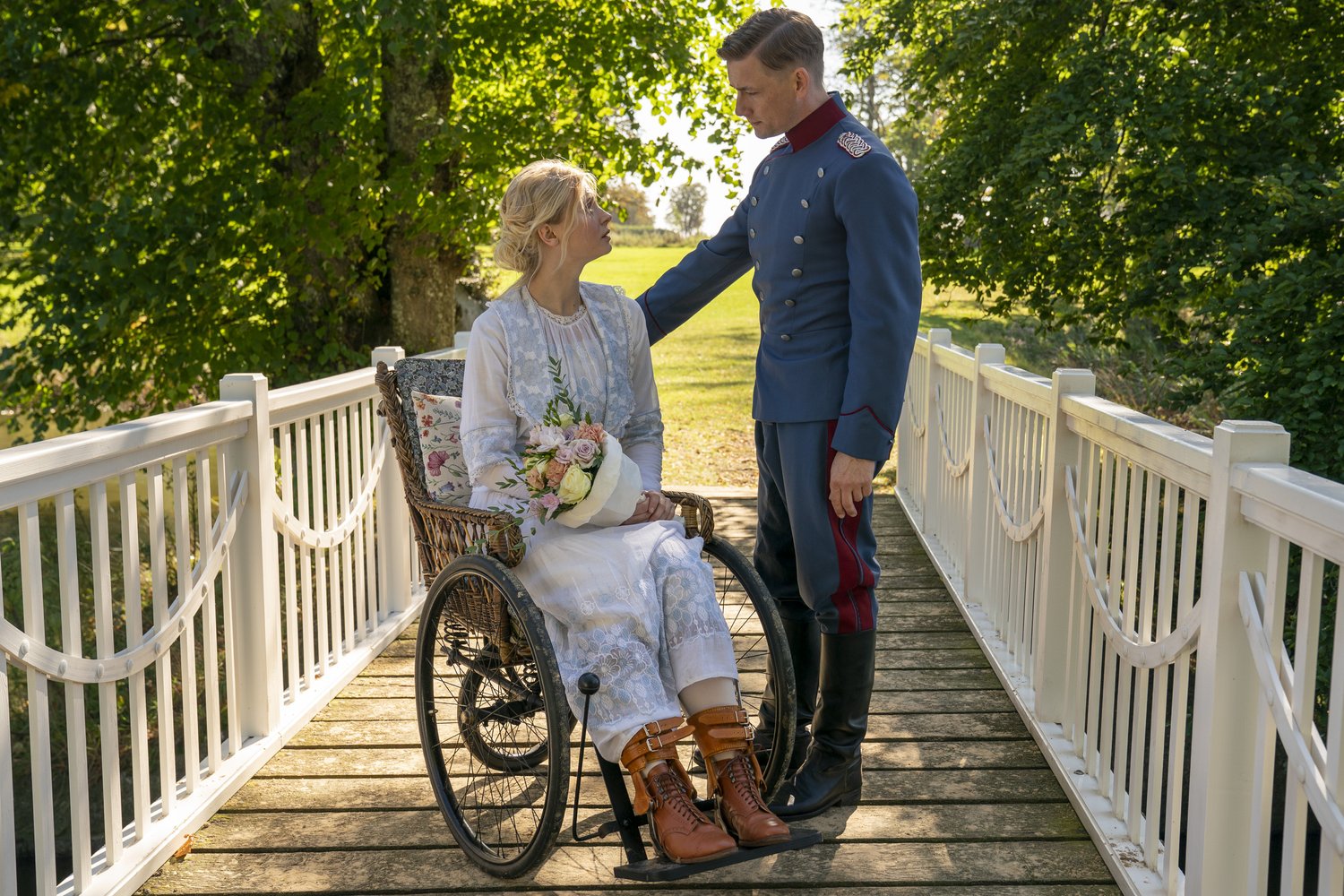Images courtesy of Juno Films
THE KISS– 3 STARS
The Kiss (Kysset), the most recent film from Oscar-winning Danish director Bille August, a two-time Palme d’Or recipient, has finally arrived in limited theaters for North American audiences. Set during the onset of World War I in August’s native country of Denmark, The Kiss is adapted from novelist Stefan Zweig’s 1939 book Beware of Pity. Thematically, that titular emotion of pity from the source material courses through this film’s every vein.
In the film, a young man named Anton Abilgaard is looking to serve in the dragoon cavalry of the Danish army in 1914 as a path to restore his family’s honor. Played by Esben Smed (an award-winner in August’s last picture, A Fortunate Man), he is the son of a scandal-laden, absentee father. The Kiss introduces him sitting beside his mother, pitching his case to a rich aunt to secure the money for his horse, servant, saber, and uniforms. His financial wish is granted and Anton rises in the ranks to become a 2nd Lieutenant.
LESSON #1: ELICITING PITY—To reach this point, Anton was banking on not only favor but also pity from his senior relative, thus beginning this film’s travails in this emotional expanse. His spoken goals may have been honor and patriotism, but Anton was eliciting pity, not only for himself but also for his disgraced mother and her downgraded social standing. We see his pity toward her when he nudges her not to repeat herself to their aunt. He’s doing this for her.
LESSON #2: PITY LEADING TO COMPASSION— Luckily, pity can be a oath toward compassion and empathy, and that seems to be a character streak for Anton Abilgaard in The Kiss. He is a diligent soldier, fair to his men, and predominantly stays away from the cocky entitlement that often comes with his rank and uniform. When Anton’s group encounters the aging aristocrat Baron von Lovenskjold (Lars Mikkelsen of Ahsoka fame) on the side of a road with car tires stuck in a muddy patch during a training maneuver, he breaks routine to have him and his men push the Baron free. Billed a Good Samaritan by the grateful socialite, Anton is rewarded with an invitation to dine at the Lovenskjold manor.
Attending the dinner in his dress uniform, the Baron regales his guests with Anton’s recent heroism. Alas, compassion is gaining our protagonist his honor and maybe a new source of favor. Like a true dashing man in uniform, Anton impresses the Baron’s only daughter, Edith (Clara Rosager of Morbius), and has his own head turned by the Baron’s fetching niece Anna (Rosaline Mynster, also gracing screens in 2025 with A Copenhagen Love Story on Netflix). All is well until he asks the sitting Edith to dance and doesn’t notice the splints on her legs from a horse-riding accident that led to partial paralysis. He excuses himself from the party out of embarrassment. Cue the dripping faucet of self-pity in The Kiss.
Trying to make things right, Anton has flowers delivered to Edith, leading to another summons from the Baron. The elder statesman sees and values Anton’s kindness and invites him to regularly visit Edith to lift her spirits with quality time while she receives treatment from a local physician, Doktor Faber (David Dencik of No Time to Die). Even the doctor encourages Anton to be a helpful presence in Edith’s life. Of course, our straight-arrow do-gooder cavalryman cannot and will not disrespect such a request.
LESSON #3: THE NEGATIVE EFFECTS OF PITY– This amiable union leads to the negative effects of pity in The Kiss. The impulsive and reckless Edith quickly becomes ardently smitten with Anton, cues that he misses mistakenly. Pity turns into false hope, which creates more self-pity and the potential for self-harm. For him—accelerated by his fellow soldiers who jeer him and think he’s ingratiating himself to this girl for her father’s money—his commitment to this companionship does not rise above pity for a “cripple.” Edith bemoans the pity and desires honesty. Soon, matching Edith’s longing needs and her father’s guilt-ridden requests to find both a cure and happiness for his daughter leads to a ruinous path of compounding lies and denials for the normally conscientious Anton.
Lasting love, set to the gentle balletic score of Henrik Skram (Rose), is the cardinal expectation thrust upon Anton in The Kiss, and he cannot bring his pride, honor, and heart to deliver that. In a very precise performance, Esben Smed allows his character to become twisted into a multitude of knots, each taxing his personal resolve and soldier’s dedication, especially with Denmark staring down the barrel of the Great War breaking out in their European neighbors. Because his character means well more often than not, his Anton never becomes the cad of the picture. He is the handsome and humble man we want to succeed. Likewise, Clara Rosager plays the troubled and lonely Edith with hues of hope that massage what could have been an art-house Stage 5 Clinger role. Her depth of painful layers compliment Smed’s work.
With that sense of tragedy in mind, each escalating emotional predicament in The Kiss has an exit strategy junction point where everyone can stay happy if better decisions are made. Naturally, there wouldn’t be a high, chaste-challenging melodrama without poor choices and fateful locked lips. This is where the period era of The Kiss rears its antiquated head as well. Paralysis isn’t getting cured anytime soon, and society drastically looked down on the handicapped a century-plus ago. Holding hope for any bold and progressive steps down an alternative path of universal acceptance for mistreated people was not going to happen in 1914 in the movie’s setting, in 1939 when the book, and probably not in most present social circles in 2025.
LESSON #4: QUESTION YOUR OWN LEVEL OF PITY– Come to think of it, the challenge of The Kiss comes full circle back to pity; only this time it’s the pity held by the watchful film audience. One must measure their levels of pity for Edith, Anton, or the Baron. Would we be open to romantic love with someone with an extreme medical condition, such as paralysis? Would we understand a father’s remorseful urgency to heal a child’s missing happiness? All the while, Anton is the ultimate barometer for our pity. We watch the character’s obvious mistakes—things we would likely shout out loud or shake sense into his shoulders to realize—and withhold finding Anton fully at fault until we, the viewer, reach our either soft-hearted or unsentimental thresholds of when empathy should have subdued pity.
LOGO DESIGNED BY MEENTS ILLUSTRATED (#1306)



